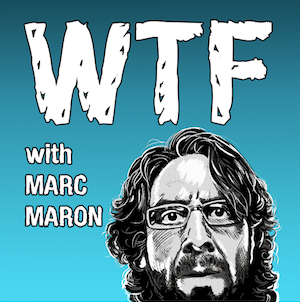 Last month, we posted an interview Josh did with The Sound of Young America‘s Jesse Thorn. During their conversation, Thorn mentioned that he was working on trying to bring his friend Marc Maron‘s interview show WTF to public radio sometime in the “late spring of this year.”
Last month, we posted an interview Josh did with The Sound of Young America‘s Jesse Thorn. During their conversation, Thorn mentioned that he was working on trying to bring his friend Marc Maron‘s interview show WTF to public radio sometime in the “late spring of this year.”
Well: It is done. Last week, WTF was picked up by PRX (FTW!), thus making it available for distribution to stations around the country. And a number have already signed on: WTF has been licensed so far by New York’s WNYC, Chicago’s WBEZ, and, as of yesterday, Austin’s KUT — with more, Thorn told me, on the way.
WTF both is and isn’t standard public radio fare. On one hand, it’s two people sitting behind microphones, one interviewing the other, a form as old as the medium. On the other, it’s far less formal and more sprawling than what you’d get from a Terry Gross or a Diane Rehm. Maron interviews comedians in each episode — Conan O’Brien, Robin Williams, Patton Oswalt, Louis C.K. — in loose conversations that can extend well beyond an hour. The format and Maron’s abilities have led to surprisingly open and revealing interviews. As Ira Glass told The New York Times, “People say stuff to him that you can’t imagine them saying to anyone else. And they offer it. They want to give it to him. Because he is so bare, he calls it forward.”
As part of the shift to a public radio format, podcast episodes had to be compacted and reshuffled to fit into one-hour time slots. There was also some bleeping necessary; WTF suggests “sensitive listeners should be advised.” Glass, who championed the show’s move to radio, insisted on keeping the name intact, acronym moralists be damned. (Check out Glass’ promos for the show below. You can hear all 10 episodes, pulled from the best of WTF’s archives, at PRX’s website.)
Thorn said he hopes that WTF can be part of a move to broaden the kind of content — and the kind of show formats — on the public airwaves. “I think the type of interview that Marc does is something that’s new to public radio,” he says. His interview style signals a shift not because it’s profane or vulgar — “which I think is what, sometimes, program directors assume about it” — but because it is raw and real in a way “that you don’t hear almost anywhere in broadcasting — outside of, to some extent, your semi-exploitative television interviews” (Oprah, Barbara Walters, etc.).
That emotional, human-to-human connection can be a rarity within a platform whose definition of professionalism is often bound up in the interviewer’s ability to express both empathy and detachment at once. (Paging Jay Rosen.) “I don’t think it’s something that has existed in public media in the context of an interview show — and especially on a public radio show,” Thorn says. He likens Maron’s interviewing style to that of…Howard Stern, since, say what you will about the shock jock, “one thing that he’s capable of doing brilliantly is finding emotional revelations in his guests. And he does that by being so honest about himself that the guest can’t help but be honest about themselves.”
That authentic element, Thorn notes — the closeness, the rawness — is part of what has made shows like This American Life and Radiolab into successes, particularly with younger listeners. And when Glass made his push to promote WTF into a show, furthering that trend was part of the idea:
It’s high time we on public radio harvest the very best of the podcasts out there and bring them to our audience. This is a great, easy, audience-friendly way to do that.
It’s about, essentially, “expanding the palette of public radio,” Thorn says: about providing listeners with new ways to understand the intimacy of the spoken word. “I think that Marc recording the show in his garage, with his books, feeds that strength of audio as a format,” Thorn says. “It’s like having something whispered in your ear. It’s automatically very intimate.”